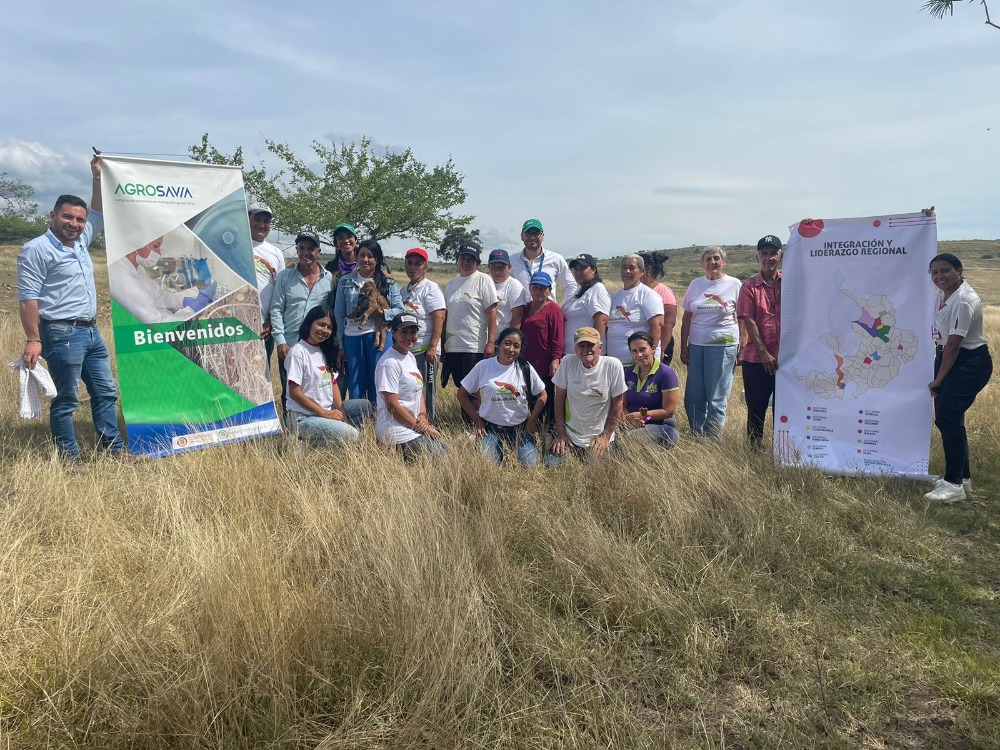- The initiative, which will last ten months, is financed with resources from AGROSAVIA, the Chamber of Commerce of Bucaramanga, and Fundación Guayacanal.
Bucaramanga, Santander. September 1, 2023. The research project entitled “Strategy for strengthening capacities and empowerment of rural women in the municipality of Los Santos, Santander,” executed by the La Suiza Research Center of AGROSAVIA, is expected to strengthen the linkage of technologies and knowledge transfer in an area that shows strong climate change effects. Through the different actions proposed, it is also likely to improve the quality of life of the population in the area, with a greater focus on rural women, whose participation in the agricultural sector is unusual.
The project arose from the identification of the need to incorporate technologies to improve agricultural productivity and family farming in the rural territory of the lower area of Los Santos (Santander), in addition to the need to open spaces to strengthen the empowerment of rural women and the relationships with other local groups and actors.
Juan Leonardo Cardona, the Leading Researcher of the project from the La Suiza Research Center, expressed that three specific objectives are proposed.
- The first aimed at identifying the potential of local forage species used in human and animal nutrition in the municipality of Los Santos, in the Chicamocha ecoregion, to strengthen enterprises led by rural women.
- The second is promoting the social appropriation of knowledge to take advantage of the potential of local forage species.
- Finally, disseminating the experience and lessons learned as an escalation strategy for the social appropriation of knowledge in other areas of the Chicamocha ecoregion.
The project began its activities in the field with the execution of two workshops focused on social cartography with a gender perspective and the socialization of part of the technological offer available from AGROSAVIA for the livestock production system (NIRS and Alimentro). In these spaces, knowledge transfer for taking forage samples for analysis was also carried out.
Considering the project approach, Researcher Clara Viviana Rúa, from the Motilonia Research Center of AGROSAVIA, considers that “Teaching rural women technical aspects related to cartography, geographic location, identification and valuation of environmental resources (soil and water), is a route to claim their rights and contribute to equity, as well as a way to contribute to reducing little by little gender gaps in rural Colombia, based on knowledge management.”
For her part, Patricia Camargo, Leader of Fundación Estación Biológica Guayacanal [Guayacanal Biological Station Foundation], expressed that the entity currently supports a group of 25 women, heads of households, on food security and local entrepreneurship issues through the use of the agrobiodiversity offered by the dry tropical forest in the Chicamocha canyon, and concluded that “especially with the use of local forage species aiming at sustainable family agriculture, through the MEEPZA model (Efficient Energy Model for Arid Zones) —a current project developed by the Foundation— the energy flow is done through the different productive processes in such a way that the goal should be that the waste of one becomes the raw material of the next.”
For his part, Juan Ricardo Zambrano, Research Support Professional at the La Suiza Research Center, highlighted that during these first workshops, secondary information about Los Santos was corroborated and added that “there is an important food security component based on small areas of transitory crops,” considering that the area has complex soil characteristics. Likewise, he stressed that because the main crop in the surroundings a few years ago was tobacco, currently, the lands are highly susceptible to erosion due to the steep slopes, and the inhabitants report the occurrence of long periods of drought.
Finally, the inter-institutional management of this work also focuses on improving the income of rural families and their environmental sustainability, given that, although the municipality of Los Santos is recognized as touristic in the department, its primarily rural population (90 % ) includes small producers with little income, and the effects of climate change have been evident in the area, causing the deterioration of natural resources such as water and soil, with serious food insecurity problems.
- More information here:
- Silvia Florez Morales
- Communications, Identity and Corporate Relations Professional
- Research Center La Suiza
- Communications, Identity and Corporate Relations Advisory Office
- sflorez@agrosavia.co
- AGROSAVIA





